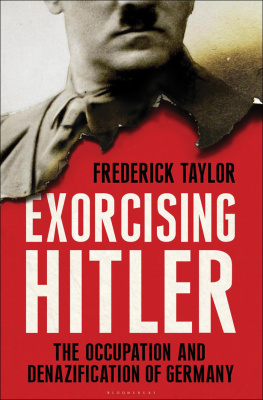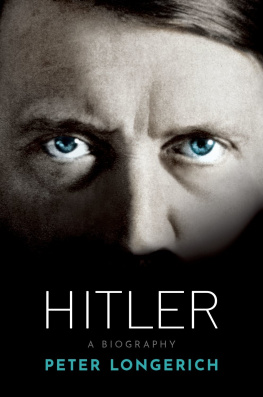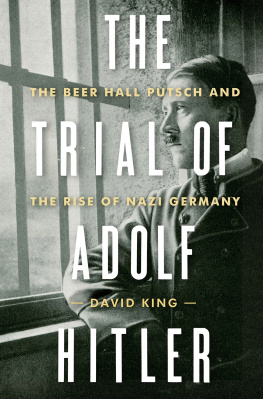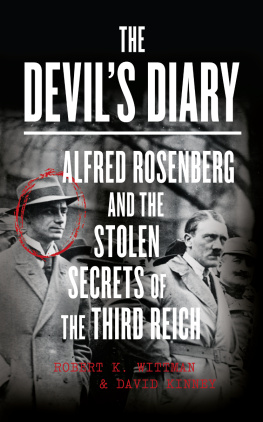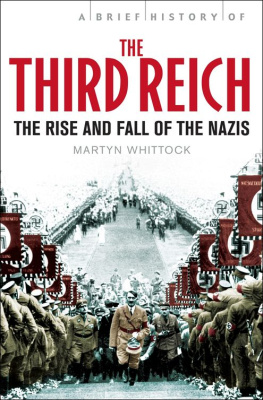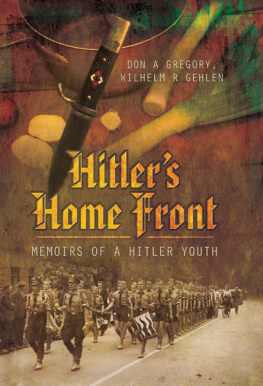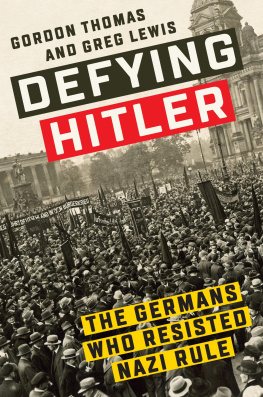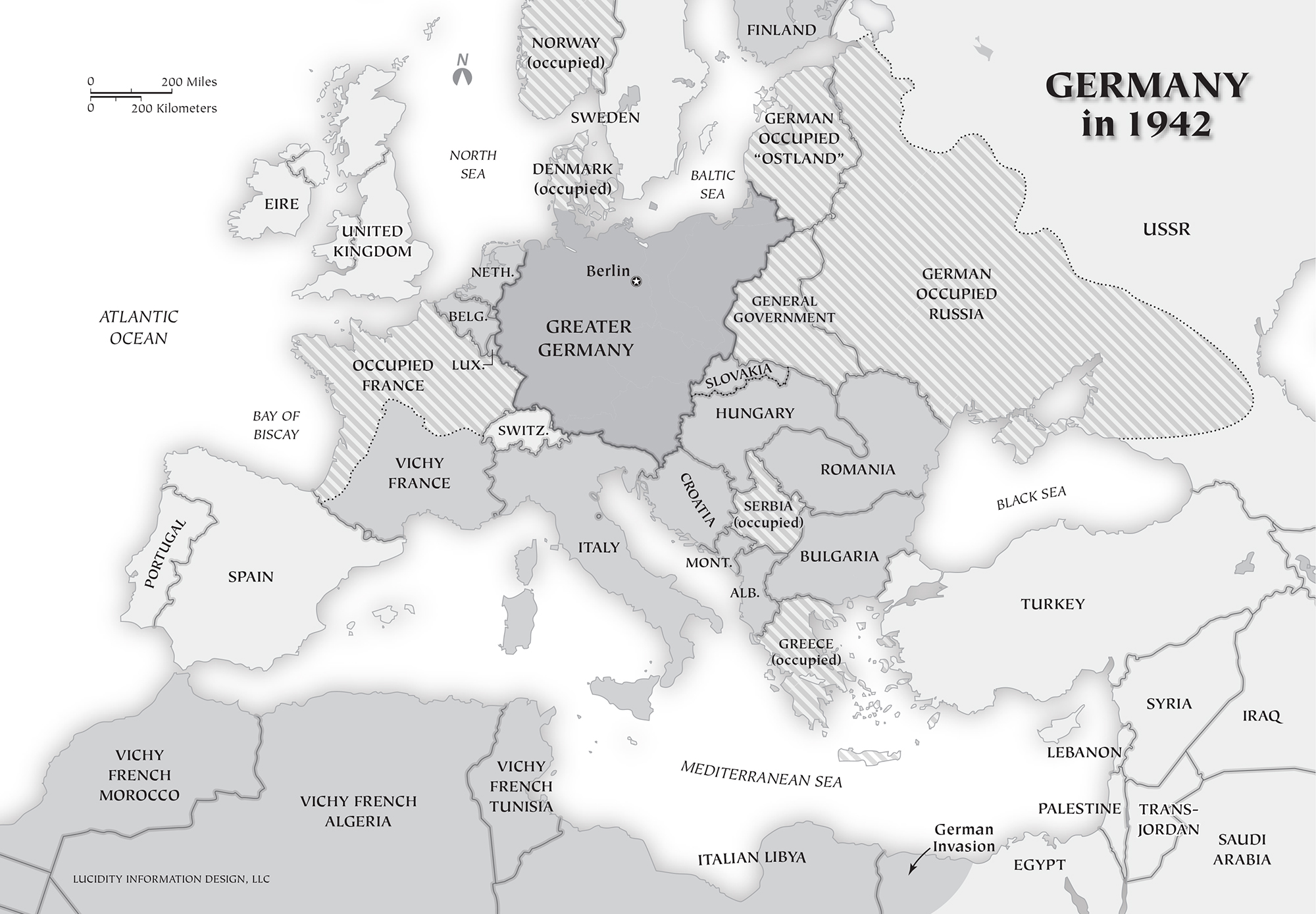For Kristen
THE GERMAN PARTY SYSTEM
GLOSSARY OF GERMAN TERMS
Ahnenpass (racial passport)
Brgfrieden (political truce)
Deutschlandflug (flight over Germany)
Einzelaktionen (individual/independent actions)
Gauleiter (district leader)
Hofoper (Court Opera HouseVienna)
Landespolizei (State Police)
Lebensraum (living space)
Mischling (mix/hybrid)
Ortsgruppen (local party chapters)
Realschule (technical school)
Salonfhig (respectable)
Schaffenden (productive)
Stimmungsbericht (morale report)
Vlkisch (populist)
Volksbewegung (peoples movement)
Volksempfnger (peoples radio)
Volksgemeinschaft (peoples community)
Volksgenossen (peoples comrades)
Volkskrper (body of the people)
Whlerei (choice/vote)
THE SERPENTS EGG
A dolf Hitler was born on April 20, 1889, in the Austrian town of Braunau am Inn on the German-Austrian border. His father, Alois Hitler, was a provincial customs official of liberal views who had risen from an unpromising background to the respectable status of middle-grade civil servant of the Habsburg Empire. Aloiss patrimony was a source of controversy and rumor. He was the illegitimate son of Maria Anna Schicklgruber and an unknown father. In 1842 Maria Anna married Johann Georg Hiedler, and in 1876 Alois adopted the name of his stepfather, later changing the spelling to Hitler. As the Nazis came to prominence and Adolf Hitler emerged a national political figure, there was some speculation that Adolfs unknown grandfather was Jewish, but no credible evidence to support such rumors has ever surfaced.
The family moved several times, from Braunau to Passau to Linz, where Adolf spent most of his unexceptional youth. There was nothing notable about him in his early life, nothing to suggest potential of any sort. He read, he daydreamedhe was a great artist, a great architect, the builder of monumental buildings and grand cities, a Wagnerian hero. None of these dreams translated into serious work or training. He loved music, especially the operas of Richard Wagner, but had only a rudimentary knowledge of music. He liked to sketch, to paint in watercolors, but he had neither the talent nor the work ethic to achieve the grandiose successes he envisioned.
Hitlers father provided a comfortable existence for the family. He hoped that young Adolf would follow him into government service, and he had little patience with his sons dreaminess. He was a gruff, authoritarian paterfamilias , a strict disciplinarian who terrorized his indolent son. Beatings were not infrequent. Adolf took refuge with his mother, Klara, who doted on him. Alois had three children from an earlier marriage but three of his children with Klara died, two brothers and a sister, before Adolf was born, and Klara was determined to protect this son spared by providence. Sickly as a baby, he grew to be very much a mammas boy, lazy, self-indulgent, and coddled. His father died in 1903, when Adolf was fourteen, easing some of the tension in the Hitler household.
Young Adolf was a loner, a perpetual outsider. He had few friends, in fact, only one to speak of. He showed little interest in girls, had no sweethearts or even friendly relationships with the opposite sex. He shied away from physical contact, only reluctantly shaking hands; he was almost pathologically sensitive about anything concerning the body, according to his one genuine friend, the son of an upholsterer in Linz, August Kubizek, who aspired to be a musician. Together the boys roamed the Danubian countryside, strolled the streets of Linz, and attended the opera, Adolf expounding all the while on his many enthusiasms. Kubizeks essential qualification for Hitlers friendship was that he was a good listener. Impressionable and unassertive, he hung on Adolfs every word. In return he was granted visiting rights into Hitlers intense fantasy world, a world of grand illusions in which Adolf Hitler would be recognized as an artistic giant, an architectural genius, a shaper of worlds.
Hitler was, to put it generously, an indifferent student. His grades were so poor at the technical school ( Realschule )he failed math; he failed German!that he was held back a year and forced to take qualifying exams to avoid being held back a second time. Misunderstood and unappreciated, by his lights, he had had enough, and at age sixteen he left school without a degree. He set his sights on a career in art and hoped to gain admission to the Academy of Fine Arts in Vienna. In July 1907 he convinced his mother that he should go to Vienna to prepare for the entrance exam, which was held every year in October. Initially he was captivated by the city, especially its magisterial buildingsthe Opera, the Parliament, all the grand structures along the Ringstrasse. It was the great world, far from provincial Linz.
Supremely confident in his own talents, he did little in the way of preparation for the exam. He submitted a portfolio of his drawings and sat for the exam, but to his utter astonishment he failed. I was so convinced that I would be successful that when I received my rejection, it struck me as a bolt from the blue. It is telling that while Hitler was a passable draftsmanhe could draw buildings, street scenes, structures of all kindshe was unable to render the human form. He was hopelessly unqualified for painting, one examiner told him. Perhaps he was better suited for architecture. Hitler liked the idea, but the academys School of Architecture required a high school degree or at least some previous technical training, which thanks to his own negligence he could not provide. There was, he realized, no chance that he could study painting or architecture. Hitler kept this humiliating rejection a secret, never telling his gravely ill mother and waiting months before confessing it to his loyal friend Kubizek. In December 1907, his mother died after a painful and protracted battle with cancer. Adolf rushed back to Linz to care for her in her final days and was devastated when she finally succumbed. His mothers death shook Hitler to the core. The family doctor, a Jewish physician from Linz, later recalled that he had never seen anyone so overcome with grief as eighteen-year-old Adolf.
After settling his mothers affairs and arranging for his orphans pension to be forwarded, he returned to Vienna in January 1908, still hoping to pursue his dream of becoming a great artist. He settled back into his dingy room in the Stumpergasse, located in a derelict section of the city near the West Train Station. When he learned that Kubizek was preparing for the entrance exam at the Conservatory for Music, Hitler convinced him to share his quarters. The two young men, neither yet twenty, lived together for five intense months, from February to the end of July in 1908. Kubizek provided the perfect audience for his friends endless lectures. Adolf had opinions, passionate opinions, about everythingart, opera, architecture, politics, morality, even diet. When Kubizek meekly ventured to offer his own opinion, Hitler would burst into a rage, storming around their shabby room, shouting imprecations, pounding on the door, the walls, and Kubizeks rented piano. He would tolerate no dissent. He was determined to retake the academys admission exam, but he could not be moved to prepare. While Kubizek studied diligently and passed his entrance exam to the conservatory, Hitler spent his time developing fantastical schemes of all kindshe would write an opera, a play, reform workers housing in Vienna, rebuild the city of Linz; he would establish a traveling symphony orchestra and even develop a new soft drink. His feverish imagination lurched from one grandiose project to the next without missing a beat. When a new inspiration seized him, he would talk obsessively about it for days, sometimes weeks; he would make notes, write scenes, draw sketches, only to drop the whole thing from one day to the next, never to mention it again. He could never complete a project.




